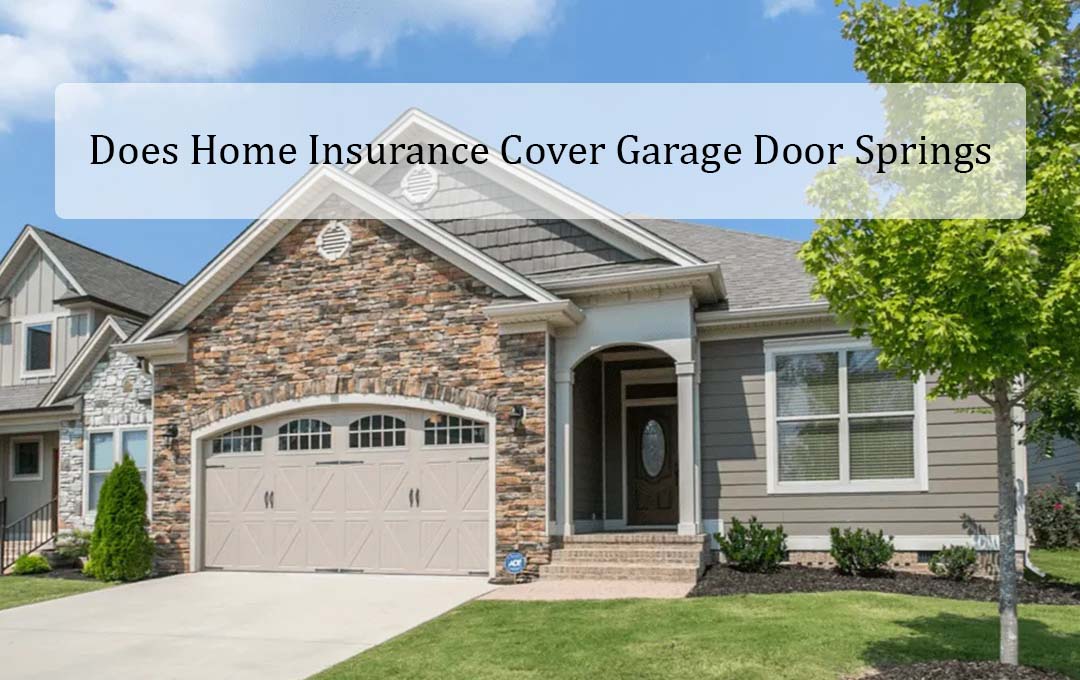Do you think these thoughts – Does home insurance cover garage door springs? Not a bad one because your residence is likely one of your most valuable assets, so you insure it against disasters with a homeowner’s policy. But what happens if your garage door sustains damage? Can you file a claim to pay for repairs or replacement?

This article explains typical coverage when garage doors are affected by accidents or extreme weather.
How Insurance Handles Garage Door Claims
Homeowners’ policies vary in coverage and protection, so review yours thoroughly to understand what is covered. You may be able to customize it if you want more safeguards for your garage. Contact your agent to clarify confusing legal wording. They can decode policy specifics. Many common garage door problems fall under standard coverage.
What Kinds of Garage Door Damage Does Insurance Usually Cover?
Here are some frequent garage door damages that basic homeowners plans commonly pay for:
Car Accidents Impacts
If a household member unintentionally collides with the garage door, resulting dents or fractures are generally covered. So your policy would pay for repairs if your college-aged son accidentally reverses into the door. However, injuries or vehicle damage itself are only addressed by auto insurance, not homeowners.
What if a visiting relative or neighbor smashes your garage door? As long as they carry active auto insurance, their liability provision would pay first. If their limit does not fully fund repairs, your homeowner’s coverage kicks in for the remainder. Additionally, if an uninsured motorist flees after hitting your garage, your policy would cover the damages.
Burglary
Forced entry destruction, including a damaged garage door, falls under standard home insurance. It may also replace stolen possessions up to a designated value cap, varying by policy. Increase this if you store high-dollar items in your garage.
Malicious Mischief
If a random vandal intentionally destroys your property, it violates your rights. Fortunately, homeowners policies usually pay for repairs due to malicious mischief like spray-painted obscenities or physical damage from weapons. You’ll likely need to complete a police statement when filing an insurance claim for such acts.
Fire Damage
Blazes can decimate homes, but carrying adequate insurance provides confidence that devastating losses will be covered. So if your house catches ablaze, expect your policy to fund garage door replacement too. However, naturally occurring fires like wildfires may mandate separate riders.
Violent Weather
Standard homeowners insurance commonly covers damage stemming from fierce windstorms or hailstorms that batter garage doors. But other natural disasters like floods, quakes, or brushfires need special attachments. So if you occupy a region prone to certain severe weather types, ensure you carry tailored protections.
What Damage Doesn’t Home Insurance Cover?
While insurance enormously aids with many major outlays, some damage scenarios are omitted:
Gradual Deterioration: Garage doors eventually display signs of aging through normal wear and tear. This predictable decline over decades is not reimbursed – only sudden, accidental destruction triggers claims. But you can invest in periodic maintenance to optimize your door’s useful life.
Self-Inflicted Damage: Intentionally damaging your garage door and then falsely claiming it was a mishap equates to fraud. So if you put a gaping hole in the door yourself using a bat, don’t expect reimbursement. Carriers thoroughly investigate submissions before paying.
Small Repairs Under Deductible: Most homeowners policies dictate a deductible – the amount you pay out-of-pocket on claims before payouts activate. For example, with a $500 deductible, if a minor repair totals $250, you would fund it fully. However, for a $5,000 replacement door, you’d only pay the first $500.
What If the Garage Is Detached From the House?
If your garage structure stands wholly separate from the main dwelling, coverage intricacies arise. “Other structures” provisions envelop secondary buildings like sheds, fences, or detached garages. However, the protection percentage is slimmer than for the home itself – analyze your policy.
Does Home Insurance Cover Garage Door Repair
Yes – if a door sustains enough damage that repairs are implausible or cost-prohibitive, standard homeowners provisions will finance complete new garage door installation.
How to File an Insurance Claim for Garage Door Damage
Dealing with garage door damage and insurance claims can be confusing. Here is a step-by-step guide to help you get the repairs covered:
- Document the Damage
Take clear photos or videos showing the broken garage door components, dents, holes, or other issues. This evidence supports it was accidental rather than self-inflicted.
- Get a Repair Estimate
Contact a reputable overhead door company like Montclair to assess whether the door needs repairs or full replacement. Ask them to email an itemized quote detailing parts, labor, and taxes.
- Call Your Insurance
Agent Notify your agent of the incident and share your repair estimate for review. Ask what policy provisions apply and what your expected out-of-pocket expense may be.
- Pay Deductible Amount
In most cases, you must pay the set deductible fee upfront directly to the servicing company once repairs are approved.
- Insurance Pays the Company
The insurer then sends the remaining payment, minus your deductible, directly to the door company once repairs are complete.
How to Reduce Home Insurance Costs
Homeowners insurance safeguards your residence in case of accidents, theft, or property damage. But policy premiums can strain budgets. Try these tips to reduce costs while still protecting your home:
- Raise deductibles – this cuts most policies’ premiums substantially
- Enroll in multi-line discounts by combining home and auto policies
- Enable paperless billing and auto-pay to shave 3-5% off
- Compare rates annually as new deals enter the marketplace
- Fortify home security with cameras, alarms, and tough locks
- Complete inspections documenting home upgrades like new wiring or roof
- Take higher liability limits to demonstrate responsibility
- Maintain good credit which factors into most pricing algorithms
Contact a trusted independent insurance broker to customize the most affordable policy protecting your unique needs. With a few adjustments, you can save hundreds per year.
Conclusion
Your home is likely one of your most precious assets, so take measures to shield it. To get the best answer to Does home insurance cover garage door springs. Review your homeowner’s insurance provisions with special attention to garage door protections.
Consider adding more coverage if you store valuables in the garage or have a detached structure. Know what calamities are reimbursed before disaster strikes. And maintain a relationship with a reputable overhead door service company like Montclair.
If your garage door sustains sudden damage from extreme winds, burglars, vehicles, or other covered events, you can get repairs completed quickly and affordably.
Don’t wait until it’s too late! Contact a licensed insurance broker and Montclair Overhead Doors today to make sure you have the right policies in place to fully protect your property. Safeguard your house investment including that vulnerable garage access point against whatever unpredictable crises the future might hold.
